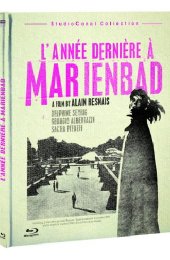Last Year In Marienbad (aka: L'Annee Derniere A Marienbad)
Oh no! A review where I can't come to any cohesive conclusion. I've degenerated into that Paul Whitehouse character on Harry Enfield's old show who agrees with everyone - even when they have opposing views.
Part of me thinks 'Last Year at Merienbad' is the work of demented genius, and yet part of me can't stop whistling the theme from 'The Emperor's New Clothes'. Add to the fact that it's thrilling, yet dull, intriguing, yet frustrating, beautiful yet repetitive and I think you get the picture. I've never felt this way about a movie before and it has me completely perplexed.
Imagine how the backers felt when they gathered to view it for the first time - and apparently left outraged, refusing to give it a release.
It arrived at my doorstep unasked for and, though I was aware of the movie's title, I had always imagined an artsy semi-political French movie. But what you get is something that makes even David Lynch seem like Knobby Normal. But I'm ahead of myself.
I should start with a bit more detail. Let's start with the disc itself - another exquisite Blu-ray release from Optimum's Studio Canal label. Sumptuously packaged (I only had a check disc so can't vouch for the final pack) in a hard-backed book style case with accompanying booklet, this disc is a treasure trove of associated background material and a really first class transfer of a stylishly shot, high contrast black and white picture. Yum!
Seen as part of the French New Wave, it sits a little outside the box. Based on a surrealistic novel by Alain Robbe-Grillet, whose important work came out of that same experimental period that saw Burroughs, Beckett and Ballard getting published for the first time, the film is a deliberately dreamlike meditation set on the very peripheries of our understanding, perhaps the twilight world of dreams.
The film has no conventional linear narrative but rather a world populated by almost ghost-like people, devoid of personality, occupying an almost zombie like existence on the peripheries of consciousness. Only two of the cast seem able to break from this world, but only partially.
In common with Ballard's literature, the film seemed more concerned with creating atmosphere and style than in telling a tale. The film equivalent of a poem perhaps or an abstract painting.
One thing is for certain; the film is amongst the most exquisitely shot of all time. Perfect geometric shapes emerging with breath-taking composition, even when the camera is elaborately tracking or being dollied. Director Resnais previously famed in native France for two classic documentaries (both included here) and the film 'Hiroshima Mon Amour' clearly has an incredible eye for composition and his technical execution is perfect. Every shot looks carefully considered and executed. The narrative may have little core but this is no slap-dash busked Warhol styled art -movie. It is, frankly, beautiful.
The film takes place in one location. A beautiful stately home with the most pristine formal gardens (fuelling speculation that 'The Prisoner' took some inspiration from the film).
The house is full of long and beautifully furnished hallways (we travel down these often) as well as great big cavernous dining rooms replete with chandeliers and statues.
The place is full of formally dressed guests but our focus is eventually drawn to only two. A man known as 'X' (Giorgio Albertazzi) and a woman named 'A' (Delphine Seyrig). The man is intense and fiery and the lady bewildered, lost and pretty vacant.
The man claims to have had an affair with the woman the year before but he can't quite remember where but he remembers that they had promised to run away together. She has no recollection of ever having met X before. A's husband (known as 'M' in the film) is a gaunt man who is constantly getting other guests to play a game called 'Nim', which he always wins even though it is based on chance. But fragments of memories do come back (as jump cuts) from time to time, and these memories have a dark side to them as if the affair was somehow violent.
All the other guests merely make up the numbers. We don't know who they are, where they're from, or even which era they're living in. There is never any indication of life outside the villa. We get no answers to the inevitable questions that the film raises. Even the significance of Merienbad is questionable. It may - or may not - be the place that the lovers met previously.
The music in the film is highly mesmerising too, composed by Delphine Seyrig's brother, Francis, and played, for the most part on a hypnotising pipe-organ.
EXTRAS
I must confess to enjoying all the extras more than the main feature. They kick off off with a useful 18 minute introduction by film critic Ginette Vincendeau, who, despite clearly admiring the film, does a good job of being objective enough to see that, for many, it is a maddening and pretentious film. She has a theory that the girl as previously been raped by the man and is denial, and certainly it's one of many theories that can be mapped sensibly against the film.
There is a fascinating documentary (subtitled) "In the Labyrinth of Marienbad" which focuses on writer Robbe-Grillet's original vision.
Next we have the French equivalent of 'Night Mail' with two classic documentaries from Renais, both absolutely fantastic. There's the 13 minute Le chant du styrene (The Styrene's Song) which is about...wait for it...plastic. It's so beautifully shot that even the driest of subjects seems fascinating. An absolute master-class in industrial film-making. Then there's a 22-minute Toute La Memoire du Monde (All the Memory of the World) which features the National French Library and all its contents. Here we really get to see his incredibly ambitious fluid camera style; in pre-steadicam days seeming to do the impossible and making the everyday seem remarkable. These two films are, in my humble opinion, worth the price of the disc alone.
Finally, there's a hefty documentary (50 Minutes worth) on writer Alain Robbe-Gillet, a likable enough man despite his outsider lifestyle. I found this very engaging and thought it would be well worth checking out some translations of his work.
So all in all - another fascinating release from Optimum Studio Canal. It exudes value and, despite the film being the most confounding of all time, I will give it another watch soon and see if I can form a proper opinion! If I do I will be back to edit this excuse for a review that is culminating in the most vague recommendations ever. Consider it a homage to this maddening movie!

































Your Opinions and Comments
Be the first to post a comment!